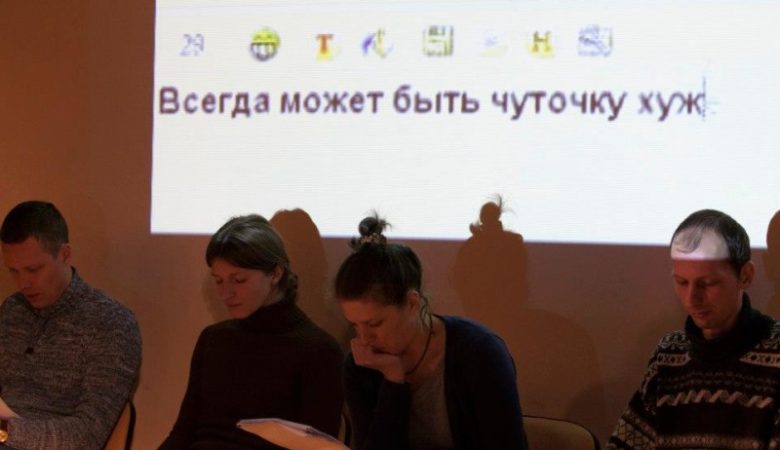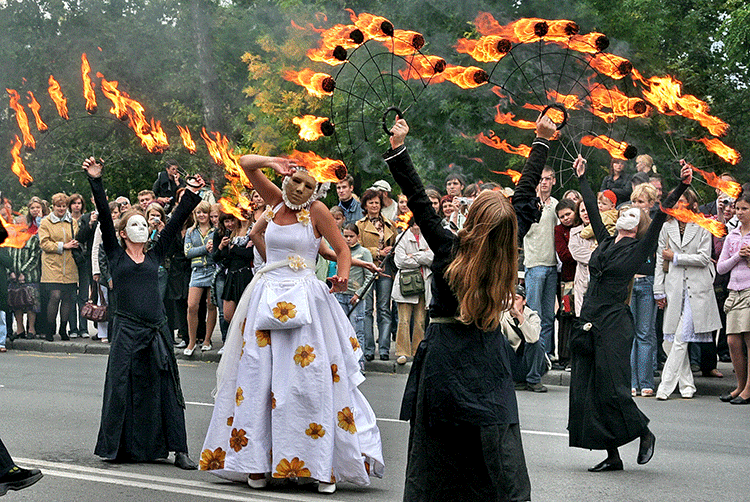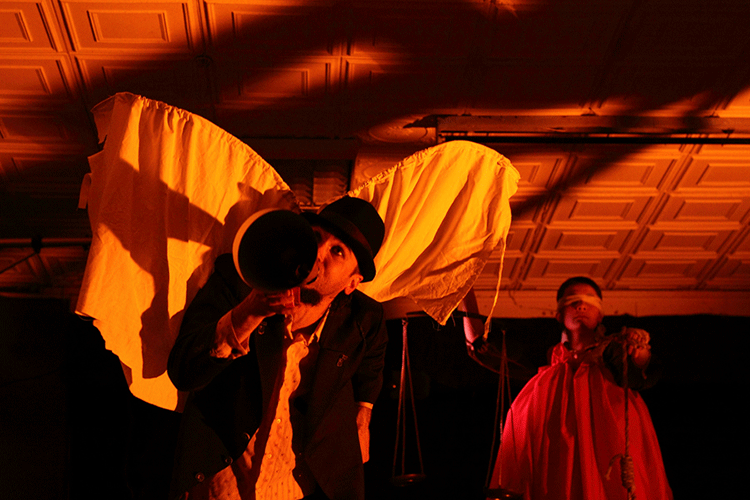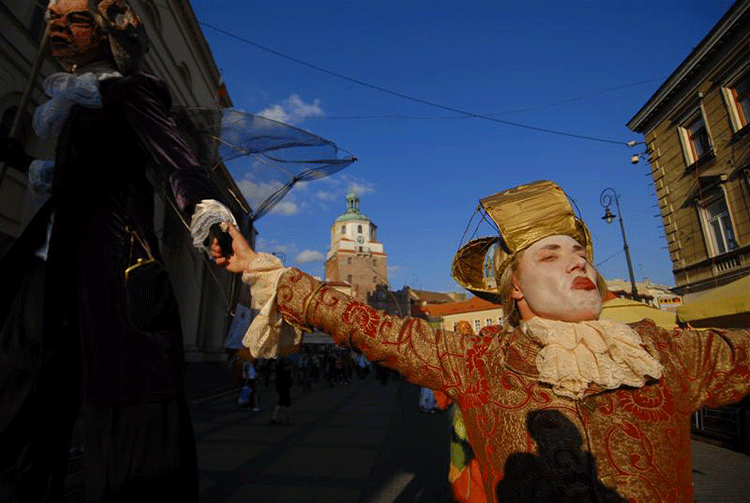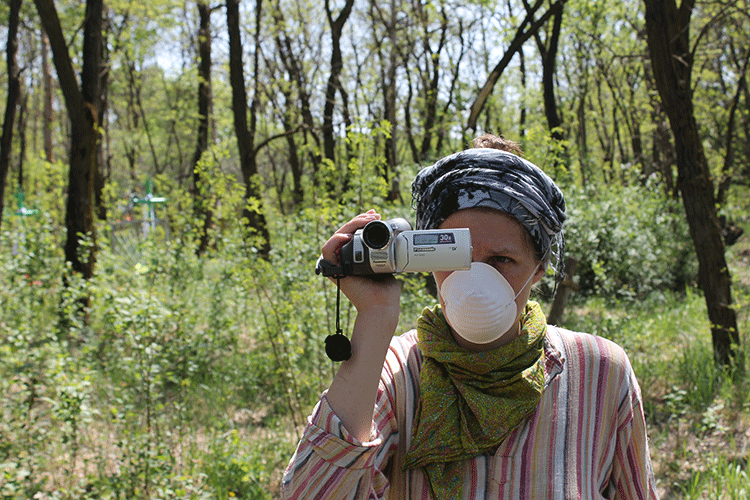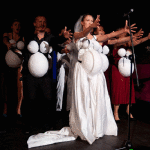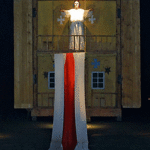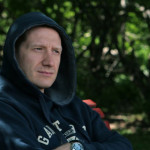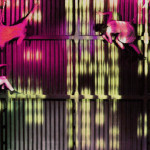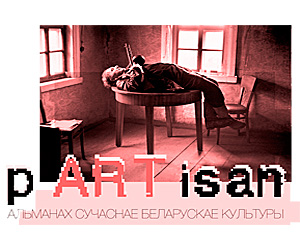There have been occasional rumors in Minsk that somewhere on the outskirts of Belarus there is another Free Theatre (not Belarusian Free Theatre that is well-known on the World). Though, being isolated in our own environment, we had little knowledge that a year before the world famous theatre was established in Minsk, a group of enthusiasts who didn’t agree with the lack of internal and external freedoms had launched their own theatre project — Free Theatre. It was 2001, and the theatre had had this name for 10 years until it was renamed “Kryly Halopa” (Note: “Wings of a Slave”). During the time of its functioning, the theatre has created about ten plays and staged performances and happenings. It regularly participates in international festivals and workshops, but not present on the official theatrical map of Belarus.
AKSANA HAIKO, the founder of the theatre, actress and director, tells about how to create while “being not free”, about a challenge to “professionals”, a fight against art commissions, and about a new stage of their activity.
− Tell us, please, how you started?
Aksana Haiko: At that time, our driving idea was a desire to change the world around, or, if not the world, then at least the situation in the city, in the country. We were very young then, and we thought it was possible. We saw the reality that we were not satisfied with, and we wanted to somehow affect it. Theatre seemed to us to be the way to tell about what had worried us and what hurt. None of us had a special theatrical education. We were raving about Daniil Kharms and decided to start with him. Six months later I was lucky to get to the Teatr Osmego Dnia to my first master class. This theatre influenced me by its active political stance: it supported the strikes of workers in socialist Poland, squatters, and was once forced to go into exile.
Then I studied at such theatres as Nukleo, Akademia Ruchu, Biuro Podróży, and Odin Theatre; I learned from Richard Schechner, Maria Nori from Living Theatre. Also, I attended best theatrical festivals in Poland and saw what the theatre could be like. Thus, when we were working at our first play, “Elizabeth Bam” by Daniil Kharms, we already knew what acting training was, we worked individually at our bodies and voices. But our original intention to change the situation around still remained.
Whatever we staged − Kafka, Kharms or “Bandarouna” by Kupala, all our plays echoed with the political and social situation “there and then”. Therefore, we are not afraid to call ourselves a political theatre.
− Why did you call yourself Free Theatre?
A.H.: We thought that through theatre we would win back freedom. We even had a manifesto which promoted a lot of big things. Here is a quote, for example: “The meaning of the word freedom has become so trite and vague that one has all the time to search for its essence. Freedom is what we are most interested in, as well as a possibility to search for it in the state of being unfree”.
− How are your street performance perceived in Brest?
A.H.: “Maleficium” was a great success at the City’s Day. This was an action in the aesthetics of European carnivals; there were drums and masks. A crowd of people accompanied this miracle in Brest. It was a fairy tale about power and money, but the external aesthetics allowed one to trace the implicit topics, so in Brest, everything went smoothly. Our last play by Kharms is about a prison, authorities, eavesdropping and spies. Everything seems to be ridiculous and absurd, but one can read behind the lines that it’s about us.
The officials definitely understand everything.
All the time they are trying to edge us to the periphery, so that we would not be seen and heard. Frankly speaking, they often succeed.
When there was no Internet, we tried to place posters everywhere as we wanted the city to know about our existence. Though, our attempts with posters had always been accompanied by hype, they say, why do you need it? Who will come to watch you? These posters had repeatedly been banned indefinitely: stay at corner of your club, show whatever you want there, but let no one know about it. Even now, not many people in Brest know about us. But it’s great that the development of has given us more opportunities. For example, we had no other way out but to broadcast online the forbidden reading of the play by Paval Prażko “The Pants”. Thus, we became the first Internet-based theatre in Belarus.
− The situation with the officials is clear. How do the ordinary viewers react to your street performances?
A.H.: About ten years ago, when we were fascinated by the success of the Polish “Orange Alternative”, dressed in bad costumes, we came to the city square with drums and paper “Navinki” (it was a famous non-official critical paper in Belarus). The public happily turned away from the stage with officials, and listened to such “clowns” as we were. Afterwards, I was invited for a “talk” where it was announced that we were dangerous for the society and our plays from then and on would have to be reviewed at the meetings of dedicated art commissions.
When we were opening the theatre festival “Bełaja Veża” (a famous modern theatre festival in Brest) with the parade “Maleficium”, the festival director said that he would not publish the name Free Theatre in the posters. It happened in 2009, Belarus Free Theatre was already well known, and was included in the informal blacklists. The director of the festival would have never let us participate, if it hadn’t been that tempting to open the “Bełaja Veża” with such a bright fascinating performance. However, the audience never learnt who we were, and that we were from Brest.
− Belarus Free Theatre started in 2005. When did you learn about it?
A.H.: They very quickly became famous.
At first, it was funny: looked like one Free Theatre was not enough for this country, there should be one more.
But, surely, it affected us directly. Our own “fame” was supported by associations with them. For example, we were placing posters, and were immediately called to report. Sometimes our stage performance was banned. We received a phone call a day before, and learnt that the play had been cancelled. In the end, we got tired to explain, and decided to change the name.
− Why “Kryly Halopa”?
А.H.: “Kryly Halopa” is one of the first Belarusian films. We’ve been long shouting about freedom, and then we grew mature and realized that nothing really changed, and we were not free. We were rather slaves who were trying to grow their wings. This is how we came up with the justification: a slave who is trying to grow his wings. We arranged a big funeral of Free Theatre: for a month we had showed performances and organized discussions, concerts, and then announced our death and birth.
− Is it possible to say that your theatre is trying to approach the reality as closely as possible? That is, trying to get rid of high-brow theatricism?
А.H.: Yes, I’ve always liked what can be called “low-brow” culture − when the guys are playing the drums on the street, or make a fire show, sing rap and dance capoeira. And I’ve always liked to work with people who have nothing to do with the theatre. For example, let me tell you how “Maleficium” was created. For me, this story is very important, and I like to bring it as an example. The thing is that it was only in Belarus that we had been asked whether we had a professional education. Though, during the selection process for the Polish festivals, no one could be bothered: they watched the video of the work and it was enough. Here it was different. We had never been allowed to participate in “Bełaja Veża” festival because we were amateurs.
We had consistently been shown that we were nobody on the on the cultural map of the city, of the country. At some point we decided that we could show this city and these “professionals” that people, who walked along the streets, were also able to create a work of art.
Among 25 participants of the parade, only 5 were actors. The rest were fire showmen, drum players, members of a tourist club who could spin flags. It was a luxurious carnival procession, which, I think, became a manifesto against the arrogance of “professionals” in Brest. But today, it looks different. Recently one journalist told me that we were pushing our Brest Drama theatre to move ahead: after our Prażko they also staged Prażko; they also had a street performance. They seem to view us as their competitors. It is actually ridiculous, because we are creating different theatres. However, local “professionals” feel very nervous about us. In addition, Brest “mastodons” of directing are making active steps to ban our performances at various committees.
− Your recent play is connected with Chernobyl theme. I understand it as an attempt to start work towards a documentary theatre?
А.H.: Yes, it is our first attempt to work in this direction. I have long been following what is happening in the documentary theatre. Actually, I’m tired of theatricism. We have started a project called “The History of Belarus” and are planning a number of performances that will tell about the modern history of our country. All of a sudden, I came to realize that I was badly aware of the place where I lived.
Why do people think that way? Why are they afraid of changes? What’s the reason of the events happening around me? There are a number of questions, and this project is, in first turn, an attempt to understand them.
Our performances are unlikely to give answers, but they will ask questions, which is very important.
There were plenty of themes, but the theme of Chernobyl came up quite unexpectedly. It has been a long time since we started to attend a summer theatre festival in Poland, in Węgajty. We are good friends with Węgajty theatre; it’s a very specific rural theatre. Their festival combines theatre, discussions on environmental issues and social animation. We have a disastrous satiation in the field of ecological education, and Węgajty just made me think about it. Not that we have not thought about it, but it was as if this issue was on the periphery of our vision. Afterwards, we were invited to stage our play “To RingFly” at Liubiatovo Anti-nuclear Camp at the Baltic. The members of the Anti-nuclear Camp got really excited by our Kharms: stupid Kharm’s characters appeared in the atmosphere of seriousness and protests. Our friends persuaded us to take part in the anti-nuclear protest action in Gdansk. So, the characters from Kharm’s play took the posters, such as “Antanina Paulauna is against the Atom”, and joined the demonstration. It really decorated the procession.
Then, I read about the construction of the nuclear power station in Astravec in Belarus now and realized that I knew almost nothing about Chernobyl. Therefore, I decided to go to the Chernoby zone and see what it was like. Our guys told us that it was a complete nonsense. But I found companions. It turned out that this thirty-year long history directly affects us today. It affects the statistics on oncology, food, the cut down on social of benefits to Chernobyl victims and radiation-phobia. In other words, Chernobyl influenced our present. Surprisingly, but people of the country, which had most suffered from the peaceful atom, and is building a nuclear power station, are silent and don’t express their opinion. Why?
It is also very interesting why our people always keep silent. Then I surfed the forums discussing the construction and realized that people actually speak, though, anonymously.
These forums become the dramatic plot for the performance. Apart from them, the play also included interviews of people who had been forced to leave the affected areas, and video records of the expeditions.
− Does it mean that you look into the future, whatever happens?
A.H.: Of course. At the same time, I feel that we have outgrown the frameworks of the theatre. What we are doing in Brest, in the region now is more than a theatre. We have launched an educational platform in Brest, namely, we organize lectures and meetings on art. We have won a regional competition “On the Way to Contemporary Museum”. I am very interested in cultural projects about what is happening in our city, possibly related to modern art museum business and the historical memory of our city.
For example, I am amazed that in the 18th century Brest was completely destroyed, then relocated 3 kilometers away, where the fortress was built. To do this, all the cathedrals and Dominican temples had been destroyed. At the beginning of the First World War, this poor unlucky city was burnt down again, only not to give it to the enemy. Our city is Russian now; there are many people who have moved from Russia.
Once, the director of the Palace of Culture asked me why we were printing posters in the Belarusian language. He said that one woman complained that she couldn’t understand what was written on the poster.
Or, let’s take the Jewish history of our city which nobody knows, the ghetto, and thousands of killed Jews at the beginning of the war. These are all amazing stories. It seems to me that there are many themes to think over and many creative activities to do.
Intervied by Tania Arcimovič, pARTisan 26’2014
On the cover // “The Pants”, dir. A.Hajko 2007 / photo from the theatre’s archive
Opinions of authors do not always reflect the views of the editors. If you note any errors, please contact us right away.

